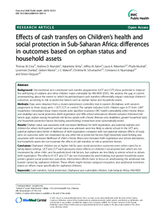Abstract
Background
Unconditional and conditional cash transfer programmes (UCT and CCT) show potential to improve the well-being of orphans and other children made vulnerable by HIV/AIDS (OVC). We address the gap in current understanding about the extent to which household-based cash transfers differentially impact individual children’s outcomes, according to risk or protective factors such as orphan status and household assets.
Methods
Data were obtained from a cluster-randomised controlled trial in eastern Zimbabwe, with random assignment to three study arms – UCT, CCT or control. The sample included 5,331 children ages 6-17 from 1,697 households. Generalized linear mixed models were specified to predict OVC health vulnerability (child chronic illness and disability) and social protection (birth registration and 90% school attendance). Models included child-level risk factors (age, orphan status); household risk factors (adults with chronic illnesses and disabilities, greater household size); and household protective factors (including asset-holding). Interactions were systematically tested.
Results
Orphan status was associated with decreased likelihood for birth registration, and paternal orphans and children for whom both parents’ survival status was unknown were less likely to attend school. In the UCT arm, paternal orphans fared better in likelihood of birth registration compared with non-paternal orphans. Effects of study arms on outcomes were not moderated by any other risk or protective factors. High household asset-holding was associated with decreased likelihood of child’s chronic illness and increased birth registration and school attendance, but household assets did not moderate the effects of cash transfers on risk or protective factors.
Conclusion
Orphaned children are at higher risk for poor social protection outcomes even when cared for in family-based settings. UCT and CCT each produced direct effects on children’s social protection which are not moderated by other child- and household-level risk factors, but orphans are less likely to attend school or obtain birth registration. The effects of UCT and CCT are not moderated by asset-holding, but greater household assets predict greater social protection outcomes. Intervention efforts need to focus on ameliorating the additional risk burden carried by orphaned children. These efforts might include caregiver education, and additional incentives based on efforts made specifically for orphaned children.

